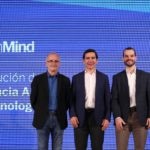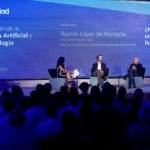Carlos Torres Vila: "Sharing knowledge improves and enhances opportunities for everyone"
BBVA Executive Chairman Carlos Torres Vila today unveiled the book 'Towards a New Enlightenment? A Transcendent Decade’ in Madrid. The book is the eleventh in a collection sponsored by OpenMind, the non-profit knowledge community created by BBVA. More than 20 authors contributed to this year’s edition, which fosters a broad based discussion about the new philosophical and ethical foundations that need to be established in order to sustain an economy, a society, a culture – and the corresponding regulation – as they adapt to the new scientific and technological contexts.

With more than 300 participating authors, the OpenMind platform is an international leader in the dissemination of knowledge about the fundamental issues of our time. The OpenMind digital community facilitates free access to content: articles, interviews, videos, and graphical views of data. Each year it publishes a book that addresses topical themes. This year it examines where the major scientific and technological advances of the past decade are leading us and their impact on human living conditions. ‘Towards a New Enlightenment? A Transcendent Decade’ is available free-of-charge and can be downloaded in English and Spanish.
During the presentation of the book in Madrid, Carlos Torres Vila was joined by two of this year’s contributing authors: Ramón López de Mántaras, one of the world's leading experts on artificial intelligence and a member of the CSIC (Spanish National Research Council) and Samuel H. Sternberg, a biochemist and specialist in clustered regularly interspaced short palindromic repeats) CRISPR, a system that has been used to edit human DNA. He is also an Assistant Professor at Columbia University)
In discussing why BBVA supports the OpenMind initiative, the BBVA Executive Chairman stated that "Sharing knowledge improves and enhances opportunities for everyone, and for society in general." When talking about the newly published book, which analyzes the most important changes that have taken place in the last ten years, he first mentioned artificial intelligence (AI): "AI will produce gains in productivity, and therefore growth. The problem is how to distribute this growth,” which according to Carlos Torres Vila could result in increased inequality.
Data handling
BBVA’s Executive Chairman explained his position on problems that stem from privacy and control of data: "Intelligent systems work better with more data, more data both in terms of quantity as well as granularity. The best forecasts will be those that have as complete a picture of us as possible.” Carlos Torres Vila agrees with some of the points raised by López de Mántaras who warns about the dangers this implies.

BBVA Executive Chairman Carlos Torres Vila during OpenMind book presentation - BBVA
"The digital economy is based on the added value that data contributes. Data is the essential raw material for building the best experience and the best products," he continued. With the Internet of things in full swing, major digital players are amassing huge quantities of data, and the challenge of ensuring that data is correctly handled during the development of artificial intelligence is such that “the individual maintains control over his or her personal data, deciding who can access it and under what conditions, and thus preventing the possible loss of privacy.”
Carlos Torres Vila emphasized the role of banks, and specifically BBVA, as trusted advisors: "We safeguard our customers' data; we assume the responsibility to protect that data and only use it with our customers’ consent and for their benefit.” And while BBVA has been undertaking this role for more than 150 years, what has changed is the quantity of data available and the ability to apply intelligence to this vast amount of data when it is being processed. This is why "we want to go beyond merely safeguarding data. We want to provide unparalleled added value, creating opportunities that help our customers in their day-to-day lives,” the BBVA Chairman said.
Revolutions in artificial intelligence and biotechnology
With 70 years of artificial intelligence history behind us, the most complicated aspect for Ramón López de Mántaras is that which at the beginning seemed to be the easiest: "Equip machines with common sense knowledge." To date, all advancements in artificial intelligence have demonstrated weak and specific artificial intelligence. Meaning: artificial intelligence that simulates mental states instead of experiencing them (which is what strong AI will do) and showing intelligent behavior only within a narrowly focused context (as compared to general intelligence).

Samuel Sternberg and Ramón López de Mántaras during their speech - BBVA
López de Mántaras stresses the need for regulation that responds to the ethical dilemmas that will arise in the current landscape, which is witnessing the exponential growth of AI-based technologies. Bio-inspired artificial intelligence, evolutionary computation, and the limitless possibilities for the application of robotics mean that there needs to be more than regulation: the general population needs to be educated about the risks that come with intelligent technologies.
For his part, Samuel H. Sternberg, an expert in the development and application of genetic editing technology CRISPR, also emphasizes the importance of raising awareness and controlling the risks associated with the significant promise represented by genetic editing, which is pushing the boundaries of biology and medicine. To ensure that this new technology is used to improve quality of life rather than fomenting a “genetic arms race,” regulation is essential.
CRISPR has the potential to cure genetic diseases – ideally permanently curing the disease – given that the genetic mutation causing the disease can be repaired by editing the pathogenic DNA sequences. An even clearer application is modifying agricultural products, which could avert famine and solve problems related to the survival of specific crops in the current context of climate change.